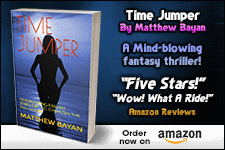Elements of Story - Motive
- by Matthew Bayan
- Oct 19, 2017
- 2 min read
Elements of Story – Motive
Every good story needs to start with a question which then needs to be answered by the end of the story. A simple example: Boy meets girl. Does boy get girl?
Every main character has a motive which feeds into the overarching question. However, the motive for a character can change over the course of the story. Using the same simple example, the boy’s motive at the beginning of the story might be to impress the girl. But as the plot unfolds, maybe he finds out something about the girl that makes him suspicious of her. His motive then becomes a desire to find her secret. By the end of the story, he may no longer want the girl. His motive may be to get as far from her as possible.
Each main character needs a motive. A story will be interesting if the motives are in conflict. Remember the definition of a novel? It’s a dramatic story told dramatically. The essence of drama is conflict and that conflict results from the different motives of characters.
In a classic book/movie such as The Silence of the Lambs, let’s look at the motives of the two main characters: Clarisse Starling, the FBI agent and Hannibal Lecter, the serial killer who is locked up in a mental facility.
Starling has overlapping motives at the start of the story. As a rookie agent, she wants to prove herself. As the story unfolds we find that she comes from an Appalachian background which gives her even stronger motive to succeed and rise above her humble beginnings.
At the outset, we think that Lecter’s motive is to play mental games with Starling, to reaffirm his mental superiority over all around him. We also suspect he has a soft spot for her and his motive is to help her in exchange for creature comforts in his incarceration.
Later in the story, we find that Lecter’s true motive – the reason for his various manipulations – is to escape from lock-up. To get back to his former life of wreaking vengeance on those who insult him or break the code of conduct that he has defined. He didn’t care at all about creature comforts. He gave Starling a reason to believe the motive he wanted her to believe.
So, at a deeper level, the motives of characters are not only being interpreted by the reader, but also by the characters. Because Starling thinks she knows what Lecter wants, she winds up being manipulated and unwittingly becomes the tool that allows Lecter to accomplish his true motive. Surprise for her and surprise for the reader.
As writers, manipulating character motives is a resource that enriches a story and provides the fuel for mystery, drama, suspense, surprise, and satisfaction for readers.
Check my blog frequently for new writing and editing tips.
And please check out my latest novels. Just click on a cover to be magically transported to Amazon.
Bestselling author and critic, David Corbett called The Firecracker King "a wicked, marvelous book."
New York Times #1 bestseller, Caroline Leavitt, said, "I loved it!"
The late, bestselling Sci-fi legend, A.C. Crispin, called TIME JUMPER “a mindblowing fantasy thriller.”













Comments